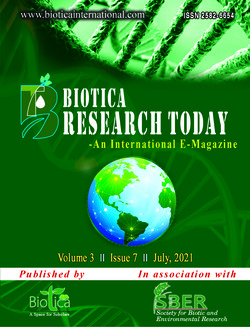
The Roles of Remote Sensing in Aquaculture Site-Selection
Rinkesh N. Wanjari
SKUAST-K, Division of Fisheries Resource Management (FRM), Faculty of Fisheries, Rangil, Ganderbal, Jammu & Kashmir (190 006), India
Karankumar K. Ramteke*
ICAR- Central Institute of Fisheries Education, Mumbai, Maharashtra (400 061), India
Dhanalakshmi M.
ICAR- Central Institute of Fisheries Education, Mumbai, Maharashtra (400 061), India
DOI: NIL
Keywords: Acoustic waves, Aquaculture, Remote sensing, Site selection
Abstract
Site selection for aquaculture production is a challenging task that entails identifying areas that are socially, economically, and environmentally suitable as well as areas that are appropriate for aquaculture. Remote sensing uses electromagnetic or acoustic waves released by the targets of interest to acquire data/ information about objects/ substances that are not in direct contact with the sensor. Geographic information systems and remote sensing technologies, which allow for the integration and analysis of spatial and attribute data from a variety of sources, have been commonly used to find suitable locations for aquaculture. This article described a summary of the roles of remote sensing in aquaculture site selection.
Downloads
not found
Reference
Handbook on Fisheries Statistics, 2020. Department of Fisheries, Ministry of Fisheries, Animal Husbandry and Dairying. Government of India.
Meaden, G.J., J.M. Kapetsky, 1991. Geographic Information Systems and Remote Sensing in Inland Fisheries and Aquaculture. FAO Fisheries Technical Paper No. 318, pp. 186-233.
Silva, C., Ferreira, J. G., Bricker, S. B., DelValls, T. A., Martín-Díaz, M. L., Yáñez, E., 2011. Site selection for shellfish aquaculture by means of GIS and farm-scale models, with an emphasis on data-poor environments. Aquaculture 318(3-4), 444-457.
